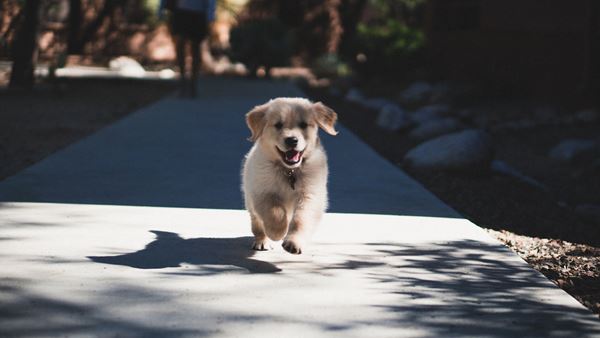If you are considering welcoming a puppy into your home, we have some top tips to ensure you are 100% prepared for your new arrival. From bedding and blankets, leads and collars, and all those essential aspects you need to consider to make the transition from littermates to furr-ever home as easy as possible.

Nothing is quite as special as inviting a new puppy into your home. However, the excitement of the arrival day can sometimes surpass some of the critical things you need to consider before picking up your new bundle of fur. So, what does your puppy need in the first few weeks and months of their life, and what can you expect when your puppy arrives?
How To Prepare Before Puppy Arrives
Before your puppy arrives home, there are some basic things you will need to do. One of the first steps is to puppy-proof your entire home. Getting down and looking from your puppy’s perceptive is a good step. Next, take note of any electrical cords, plants, or the like that could be enticing for a puppy to chew. Remove or secure these items so they are not easily mistaken for puppy toys. Puppies love to chew – and it’s no wonder considering that in a few short months, they will lose 28 deciduous teeth to be replaced with 42 permanent ones!
Now is also an excellent time to consider where your puppy will sleep or the ‘safe’ zone your pup can be placed in when you cannot supervise them. This could be a crate or penned area. Puppies need lots of sleep to grow into well-rounded dogs, so this area can double as the perfect spot to place your puppy when they need some time out – especially important in super busy households. Many owners will find that their new pups seek out this spot for a snooze when things get too loud. Creating a safe zone they can retreat to quickly is important.
In addition, now is the perfect time to sit down with your family and decide what rules you will expect from your new puppy. This can abolish many behavioral problems later down the track. Some are also common sense, as might be cute for a wee puppy to jump onto your lap, however, if you are welcoming a large breed, having a 45kg dog perched on your knee may not be suitable. Writing down a good set of house rules can ensure the whole household is on the same page regarding manners and training.
Example of house-rules
Puppy will not be allowed on beds.
Puppy will be taught to sit before walking through a door.
No jumping.
No biting or mouthing.
Puppy will sit before meals and treats.
We will only use positive/praise training methods.
What Does My Puppy Need?
You will need to purchase a few things for your new family addition. The most important aspect to consider is that many of these – depending on how big your pup will grow – will need to be replaced as your puppy grows. Collars, water bowls, and beds must be the correct size for your dog as too dog toys. A puppy chew toy can be dangerous for a fully-grown dog.
Water & Food Bowl
Collar & Lead
Name tag
Bed
Crate or Pen
Puppy specific food
Selection of toys
Brush
Gentle shampoo
Your pup should be fed the same food for the first few weeks while they settle into their new environment. If you want to change this food, always ensure you do this very slowly to avoid stomach upsets, and always feed an age-appropriate puppy food. Your puppy will also need some good quality chew and soft toys. A big teddy with long arms will also help them sleep as they adjust from having littermates sharing their bed. There are many specially designed cuddle teddies to soothe puppies – some even have heartbeats – however, a teddy with long arms and legs will suit perfectly as a snuggle buddy.
Now is also the time to book a consultation and puppy-health check with your local vet, and book your important vaccinations.

Other Important Aspects to Consider
Your puppy will need lots of love and attention but also some understanding. Some pups easily adjust to life without their siblings while others will take a little time to get used to their new home. Patience and love will help your puppy get through these first few scary weeks. If you are concerned about your pup’s behavior, always seek professional advice from a registered veterinarian.
Also, consider booking your puppy into a puppy preschool to allow them to socialize before they are fully vaccinated. Once they are fully vaccinated, it is advisable to head off to a training course with your dog. Training is a beautiful way to create a language between you and your dog, strengthening the bond you share while also keeping them safe.
Training can also be fantastic for many reasons – you can train your pup not to push past you through the door or on the stairs. This can be particularly important for large breeds when you have arms full of shopping. While having a solid recall can ensure your pup doesn’t run out onto the road and cannot be called back into safety. Training is an excellent tool for you and your dog. More importantly – dogs absolutely love it! A well-trained dog is happy and will have much less chance of suffering from many behavioral problems later in life.
TopTip – Start training as soon as your pup arrives home. You’ll be delighted with how quickly your puppy will start to do basic commands like sit and down. You can also teach your pup to go to the toilet on command. While they are sniffing in circles outside, repeat “quick go” in a high-pitched voice until the business is done. Don’t forget big praises! It will only take a short time for your puppy to understand what you are asking. This can be a blessing, particularly for those night-time toilet breaks.
If you are considering pet insurance for your puppy, this is the best time to sign-up. Pet insurance can help with veterinary care for your puppy and fully grown dog. Signing up early can allow you to take full advantage of the insurance without the risk of pre-existing conditions. Pre-existing conditions can be any condition your pet has suffered before signing up – making puppyhood the best time to enlist in a trusted provider.
With some preparation and understanding, you can ensure your puppy grows into a well-rounded and well-behaved dog. If you are concerned about your new puppy’s health, well-being, or behavior seeking professional advice is essential. Problems can be easily solved in the early days before they become a hard-to-break habit.
WOOF!
Article Supplied
